We all know the standard-issue demon, all horns and sulfur and dark seduction, often done up in a bespoke suit; perhaps you’d care to trade your soul for this totally sweet vintage Jaguar, or maybe you prefer to play chess? Of all the recurring characters in Western literature, the devil and his attendant demons rank among the most familiar. If we’re talking Paradise Lost, or Faust, or the many works that bear their imprint, the devil’s evil is complicated by a rebellious grandeur, a defiance both poignant and brave in its futility. But whether his wickedness is crude or nuanced, the devil walks cloaked in tropes.
But the devil is a shapeshifter, and what we find if we lift away that cloak depends on the imaginations of those who dare to interrogate the nature of the demonic. Writers who conjure up the devil on their pages have encountered fiends both coldly alien and far too human for comfort. They’ve revealed versions of Mephistopheles who offer a hideous reflection of the culture in which they’ve appeared, who expose something about the specific forms evil takes in the modern world. But they’ve also described demons who are quirky or wistful or even oddly innocent as they create their casual havoc; demons who, like human beings, are engaged in a constant struggle with their own will to destruction. Here are five of my favorite books featuring out-of-the-ordinary denizens of Hell.
The Master and Margarita by Mikhail Bulgakov
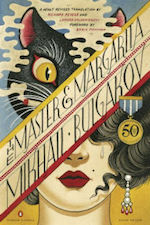 No survey of the demonic in literature is complete without Mikhail Bulgakov’s satirical masterpiece, in which the devil and a band of spirited demons visit Soviet Moscow. Bulgakov’s Professor Woland has something of the sly suavity of the classic man-of-wealth-and-taste, but with a confounding eccentricity punctuated by bursts of oddball enthusiasm. But it’s his supporting cast that really shines, from the eerie assassin Azazello to the delightful imp Behemoth, an immense and impudent black cat who, in one memorable scene, swings from a chandelier while blasting away at the secret police with a gun.
No survey of the demonic in literature is complete without Mikhail Bulgakov’s satirical masterpiece, in which the devil and a band of spirited demons visit Soviet Moscow. Bulgakov’s Professor Woland has something of the sly suavity of the classic man-of-wealth-and-taste, but with a confounding eccentricity punctuated by bursts of oddball enthusiasm. But it’s his supporting cast that really shines, from the eerie assassin Azazello to the delightful imp Behemoth, an immense and impudent black cat who, in one memorable scene, swings from a chandelier while blasting away at the secret police with a gun.
Beyond Black by Hilary Mantel
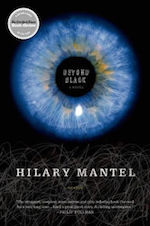 Mantel, best known for her Thomas Cromwell trilogy, is also one of the greatest chroniclers of the demonic going. Her earlier, devastating novel of a horribly traumatized, but quite authentic, psychic creates jet-black humor out of unspeakable horror. Mantel’s Alison Hart is plagued by the ghosts of her abusers, a chipper flock of grotesque spirits who discuss child-rape and sandwiches with precisely the same vapid bonhomie. The suggestion that Morris and his friends have, ah, graduated from being mere ghosts into something more hellish comes from the way that they answer to “old Nick.” “Nick he is a fambly man,” the ghouls explain, and Satan himself might cut very close to home.
Mantel, best known for her Thomas Cromwell trilogy, is also one of the greatest chroniclers of the demonic going. Her earlier, devastating novel of a horribly traumatized, but quite authentic, psychic creates jet-black humor out of unspeakable horror. Mantel’s Alison Hart is plagued by the ghosts of her abusers, a chipper flock of grotesque spirits who discuss child-rape and sandwiches with precisely the same vapid bonhomie. The suggestion that Morris and his friends have, ah, graduated from being mere ghosts into something more hellish comes from the way that they answer to “old Nick.” “Nick he is a fambly man,” the ghouls explain, and Satan himself might cut very close to home.
Blood Meridian by Cormac McCarthy
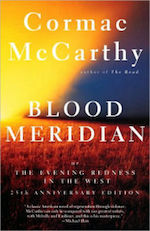 McCarthy’s nightmare Western follows a band of sadistic marauders as they inflict atrocities on anyone in their path. But even these psychopaths, who festoon trees with dead babies, live in awe-struck dread of their leader, the judge, who can overhear the slightest whisper of dissent with “ears like a fox.” The judge spouts a morose and hellish philosophy as his men enter, all too eagerly, into the creation of an Inferno on earth. It’s the following exchange, though, that reveals the judge’s true identity:
McCarthy’s nightmare Western follows a band of sadistic marauders as they inflict atrocities on anyone in their path. But even these psychopaths, who festoon trees with dead babies, live in awe-struck dread of their leader, the judge, who can overhear the slightest whisper of dissent with “ears like a fox.” The judge spouts a morose and hellish philosophy as his men enter, all too eagerly, into the creation of an Inferno on earth. It’s the following exchange, though, that reveals the judge’s true identity:
The freedom of birds is an insult to me. I’d have them all in zoos.
That would be a hell of a zoo.
The judge smiled. Yes, he said. Even so.
Snake Agent by Liz Williams
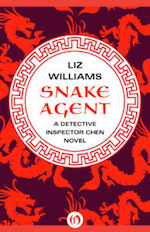 Williams’s Inspector Chen investigates crimes with a supernatural bent, and his work entangles him with a colorful assortment of demons, who, despite their bureaucratic protocols and email accounts, remain recognizably Boschian. The standout here is Chen’s infernal beloved Inari, a rather sweet, agoraphobic demon on the lam from an arranged marriage in hell. Inari aspires to an idealized human decency, but she still can’t resist deploying the occasional flippant curse, or reflexively exploiting the man she loves. Her impish sidekick, who shape-shifts between badger and teakettle, ranks among the cutest of literary hellspawn.
Williams’s Inspector Chen investigates crimes with a supernatural bent, and his work entangles him with a colorful assortment of demons, who, despite their bureaucratic protocols and email accounts, remain recognizably Boschian. The standout here is Chen’s infernal beloved Inari, a rather sweet, agoraphobic demon on the lam from an arranged marriage in hell. Inari aspires to an idealized human decency, but she still can’t resist deploying the occasional flippant curse, or reflexively exploiting the man she loves. Her impish sidekick, who shape-shifts between badger and teakettle, ranks among the cutest of literary hellspawn.
Kafka on the Shore by Haruki Murakami
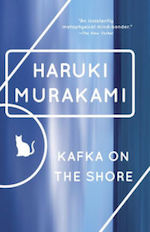 While widely appreciated as one of Murakami’s greatest novels, Kafka on the Shore is oddly neglected in discussions of the demonic in literature. But Murakami’s devil strikes me as capturing something essential that other books have missed: evil’s distinctive blending of buffoonery and sadism. A devil who fetishizes capitalist icons, and who manifests in the forms of Colonel Sanders and Johnnie Walker, might seem ludicrous—if only he weren’t engaged in the terrifying project of making a magic flute from the souls of tortured cats. The fact that he also has a human identity as the sculptor Koichi Tamura and father of the hero, Kafka Tamura, shows how readily human evil can shade into something truly demonic. The kingdom of Hell is among us.
While widely appreciated as one of Murakami’s greatest novels, Kafka on the Shore is oddly neglected in discussions of the demonic in literature. But Murakami’s devil strikes me as capturing something essential that other books have missed: evil’s distinctive blending of buffoonery and sadism. A devil who fetishizes capitalist icons, and who manifests in the forms of Colonel Sanders and Johnnie Walker, might seem ludicrous—if only he weren’t engaged in the terrifying project of making a magic flute from the souls of tortured cats. The fact that he also has a human identity as the sculptor Koichi Tamura and father of the hero, Kafka Tamura, shows how readily human evil can shade into something truly demonic. The kingdom of Hell is among us.
Top image: Fantasia (1940)
 Sarah Porter is a writer, artist, and freelance teacher who lives in Brooklyn with her husband and two cats. She is the author of several books for young adults, including Vassa in the Night, soon to be published by Tor Teen.
Sarah Porter is a writer, artist, and freelance teacher who lives in Brooklyn with her husband and two cats. She is the author of several books for young adults, including Vassa in the Night, soon to be published by Tor Teen.









